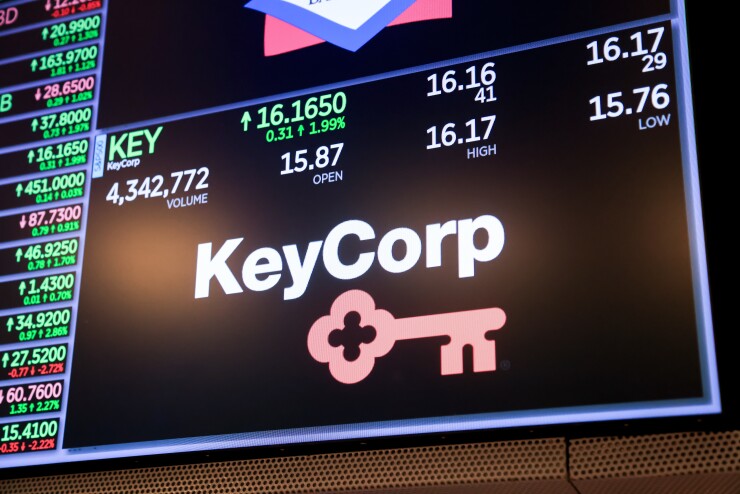KeyCorp , the Cleveland-based parent company of KeyBank, is anticipating a lot of turbulence this year for the U.S. economy. But in terms of its own course, it's not budging.
Processing Content
During a call discussing the company's first-quarter earnings on Thursday, CEO Chris Gorman described an environment full of challenges: Trade policy is uncertain, inflation remains "sticky" and spooked businesses are putting deals on hold.
"Recent events are clearly having an impact on markets and client sentiment," Gorman said. "So far in the second quarter — that is, since the tariff announcements — we have seen our clients pause transactional activity, waiting to see how things play out."
Still, Key is keeping its financial outlook exactly the same.
Just as it did at the start of the first quarter, the $189 billion-asset company expects its net interest income to grow by 20% this year, and its net interest margin to be 2.7% or higher in the fourth quarter, as compared to 2024. Average loans are expected to stay flat at $107.7 billion.
"Our 2025 guidance remains unchanged from January, despite a more uncertain backdrop," the company's chief financial officer, Clark Khayat, said during the call.
The contrast between Key's unchanged financial outlook and its more dire economic view was obvious enough that one analyst, Mike Mayo of Wells Fargo, asked Gorman and Khayat to explain it.
"How do I reconcile a world that seems so much more problematic with your guide that isn't changing?" Mayo asked.
Gorman responded that KeyCorp's credit book, its clients and its backlogs are all "in good shape." And in case the economy does deteriorate, he said, KeyCorp has gamed out how it would handle the worst possible conditions.
"Our base case is not that we will go into a recession, but I can tell you we run a whole bunch of scenarios, including stagflation scenarios … and in each instance, we're holding up well," Gorman said.
Key is not the only bank that has simultaneously warned of economic risks and left its guidance unchanged. In an earnings call Thursday, State Street also held fast to its full-year outlook while acknowledging "uncertainty" and "variability" in the environment.
One advantage for Key, Gorman said, is the substantial cushion of capital it recently got from Scotiabank. At the end of 2024, the Canadian bank invested $2.8 billion in Key, becoming the company's largest shareholder. The added capital helped Key rework its balance sheet and improve its profitability — just before the economic waters got choppier.
"In retrospect, the Scotiabank strategic minority investment that we closed at the end of last year was well timed," Gorman said. "It enabled us to reposition our business for the future, accelerating our capital and earnings trajectory, while increasing our strategic agility to successfully navigate exactly the type of environment we are currently experiencing."
During the first quarter, Key's earnings came in just above Wall Street's expectations. Earnings per share were 33 cents, a penny more than analysts' average estimate of 32 cents, according to S&P. Revenue totaled $1.77 billion, slightly above estimates of $1.75 billion, per S&P.
Key's quarterly net income was $405 million, up from $219 million in the same period last year. The improvement was partly driven by net interest income, which rose almost 25% from the prior year to $1.1 billion.
Another factor was a sizable drop in expenses. Noninterest expense came out to $1.31 billion in the first quarter, down $12 million from the same period last year.
The lower expenses were primarily a result of what was missing this time, according to Key: In the first quarter of 2024, following the regional banking crisis, the company had to pay a $22 million special assessment charge to the Federal Deposit Insurance Corp. That charge, the company said, "more than offset increases in personnel and technology-related investments" in the first quarter of last year. With that burden removed, expenses sank in the first quarter of 2025.
Overall, KeyCorp's quarterly performance gave some analysts confidence that the company can stick to its targets this year.
"Despite the recent economic turbulence, its January 2025 guide was unchanged," David Long, director of equity research at Raymond James, wrote in a research note. "As such, we expect investors to react positively to its results."
Shares in KeyCorp were trading at $14.56 on Thursday afternoon, up 3.5%.







